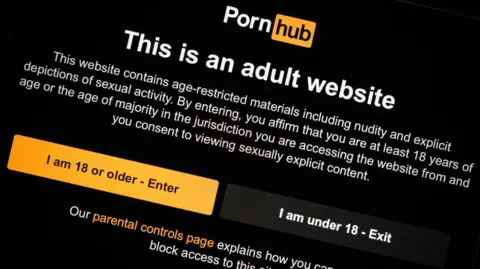Pornhub, one of the most recognizable adult websites globally, is set to implement “government approved” age verification mechanisms for users in the United Kingdom. This announcement comes from Aylo, the parent company of Pornhub, YouPorn, and RedTube, as part of compliance with the UK’s new Online Safety Act, which mandates robust age verification protocols on adult websites. The specific methods to be utilized for age verification have yet to be disclosed, but it’s clear that the current practice of merely clicking a button to affirm one’s age will fall short of the new requirements outlined by UK regulators.
Historically, Pornhub has been resistant to implementing age checks in other countries, most notably in France where the site faced challenges and ultimately chose to suspend its offerings in response to stringent age verification regulations. Currently, the Online Safety Act calls for adult websites to adopt stringent age verification techniques by the summer of 2025, ensuring that users can no longer access pornography without appropriate age confirmation. This could involve photo identification or credit card checks, which are seen as more reliable than the simple age affirmation methods employed to date.
Aylo has committed to rolling out these new age verification methods by July 25th. As the most trafficked adult site out there, measured by data from analytics firm Similarweb, Pornhub’s compliance with these regulations is critical not only for its operation in the UK but also sets a precedent that may influence regulatory actions in other nations. The company’s efforts stem from increased scrutiny from governmental bodies around the world focusing on how effectively adult platforms protect minors from accessing age-inappropriate content.
In the UK, the regulator Ofcom is investigating adult websites, including Pornhub, for potentially failing to conform to child safety regulations. Aylo’s Vice President of Brand and Community, Alex Kekesi, stated that Ofcom presented various less intrusive, yet effective age verification methods compared to those encountered in other jurisdictions. He praised Ofcom’s approach as a balanced one, acknowledging the complexities involved in enforcing effective age verification practices while also respecting user privacy.
Despite the positive tone of Aylo’s statements regarding collaboration with Ofcom, the exact nature of the age verification methods to be employed remains unclear. As the situation progresses, it is anticipated that further clarity will emerge, especially as the deadline nears for compliance with the new regulations.
The implications of this move extend beyond just compliance; they also reflect a significant shift in how adult content will be accessed in the UK and potentially worldwide. Companies may need to rethink their user engagement strategies and technological infrastructures to adapt to these new norms. The age verification process, if done correctly, may not only curtail underage access to adult content but also usher in a new era of accountability for online platforms.
Overall, this development presents a complex interplay between user freedom, industry compliance, and regulatory oversight, a balance that various stakeholders will be watching closely. As Pornhub prepares to meet these government-mandated age checks, the effectiveness of their methods will ultimately be scrutinized, and response from the public and government regulators will likely shape the future of adult content accessibility in the digital age. The broader conversation surrounding online safety, privacy concerns, and the imperative of protecting children continues to unfold as the dynamics of the internet evolve alongside changing societal norms.











